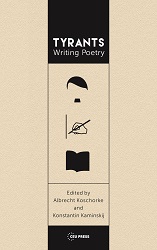Poetry and Tyranny
Poetry and Tyranny
The Case of Benito Mussolini
Author(s): Richard James Boon Bosworth
Subject(s): Politics / Political Sciences, Literary Texts, Sociology
Published by: Central European University Press
Keywords: Mussolini;Poetry
Summary/Abstract: Where words were concerned, Benito Mussolini, fascist Duce lording over Italy from 1922 to July 1943 (and then, restored by his Nazi allies in the troubled role of “puppet dictator” from September 1943 until his death on 28 April 1945), was a fertile creator. His “complete” works have been assembled in forty-four volumes,2 and, despite their length, they exclude much more material. Probably the most lasting image of this Italian dictator is of him orating, his body, face, and hands in constant if jerky movement with the passion of his phrase making, words bellowed from a balcony or some other elevated spot to the crowd below. The audience was a necessary part of this mise-en-scene. The dictator resounds into the present as the conductor of a modern political antiphony, needing and receiving response from a star-struck crowd, chanting “Duce, Duce, Duce,” “Eia, Eia, Eia, alala,” “A Noi,” and the other simple slogans of the regime. The crowd’s place was loyally to fill any pauses in the oration. When, finally, there was silence, regime propagandists claimed (to approval from some contemporary historians) that this staged charisma had fused leader and people into a mystical union. The enactment of the Duce, as it were, had provided a modern political version of sexual orgasm or religious transubstantiation. Here was the full expression of totalitarian rule over the human spirit.
Book: Tyrants Writing Poetry
- Page Range: 36-59
- Page Count: 24
- Publication Year: 2017
- Language: English
- Content File-PDF

